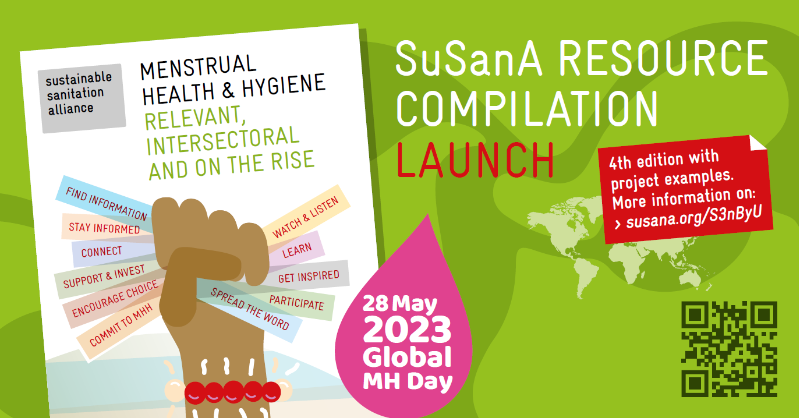- Forum
- categories
- Equity, inclusion and sanitation workers
- Menstrual health and hygiene (MHH) or Menstrual hygiene management (MHM)
- Awareness raising and reducing taboos
- Stay informed: Papers, Guidelines and Publications
- Introduction to Stay informed: Papers, Guidelines and Publications
Introduction to Stay informed: Papers, Guidelines and Publications
1666 views
- secretariat
-
 Topic Author
Topic Author- Moderator
- SuSanA secretariat currently allocates 2 full time person equivalents of time from members of GIZ Sustainable Sanitation Team: Arne Panesar, Alexandra Dubois, Maren Heuvels, Teresa Häberlein, Daphne Manolakos and Bettina-Sophie Heinz.
Introduction to Stay informed: Papers, Guidelines and Publications
With many organizations and initiatives focused on MHH around the world, there are new papers, publications and other exciting news being released all the time. These include helpful guidelines for introducing MHH in diverse settings and for different target groups, as well as new studies on the global status of MHH. It is important to note that MHH is an evolving issue and that the resources included here only provide a snapshot of some of the publications available.
The Palgrave Handbook of Critical Menstruation Studies
Bobel, C., Winkler, I. T. , Fahs, B., Hasson, K. A., Kissling,
E. A., Roberts, T-A.; Palgrave Macmillan Singapore, 2020
Field-defining handbook which provides a comprehensive and carefully curated view of the state of the field of Critical Menstruation Studies, whilst also pointing toward new directions in research and advocacy. Readers will gain a deep understanding of the depth and breadth of the best of the extant literature as well as iterative questions pertinent to the field.
👉 springer.com: bit.ly/3pKhmXj
Menstrual Health and Hygiene Resource Package
World Bank Group, 2021
The purpose of this resource package is to assist World Bank task teams in ensuring that their projects are inclusive and responsive to the needs of women and girls. The tools
included in this package are practical and user-friendly and guide task teams on how to design and monitor effective, inclusive, and sustainable menstrual health and hygiene
(MHH) initiatives as part of their water supply, sanitation, and hygiene (WASH) interventions.
👉 susana.org/C77YB1
Guidance on Menstrual Health and Hygiene
UNICEF, 2019
Menstruation is a natural fact of life and a monthly occurrence for 1.8 billion girls, women, transgender men and non-binary people of reproductive age. Yet millions of menstruators around the world are denied the right to manage their monthly menstrual cycle in a dignified,
healthy way. This guidance was developed for specialists in WASH, education, health and gender, as well as for country offices which are working with partners to develop programmes related to MHH.
👉 susana.org/PrcxX5
Nepal’s Menstrual Movement: How MenstruAction is making life better for girls and women in Nepal — month after month
Evans, R., & Broch Alvarez, V., 2019
This publication explores the work of the MHM Partner’s Alliance Nepal in improving menstrual health and hygiene; it also addresses the taboos surrounding menstruation.
While this publication focuses on Nepal, it can serve as an example of good practice for establishing national alliances in other countries.
👉 susana.org/chcYIX
A Toolkit for Integrating MHM into Humanitarian Response
Sommer, M., Schmitt, M. & Clatworthy, D., 2017
The Menstrual Hygiene Management (MHM) in Emergencies toolkit aims to provide streamlined guidance to support organizations and agencies seeking to rapidly integrate
MHM into existing programming across sectors and phases.
👉 susana.org/9tma40
The Palgrave Handbook of Critical Menstruation Studies
Bobel, C., Winkler, I. T. , Fahs, B., Hasson, K. A., Kissling,
E. A., Roberts, T-A.; Palgrave Macmillan Singapore, 2020
Field-defining handbook which provides a comprehensive and carefully curated view of the state of the field of Critical Menstruation Studies, whilst also pointing toward new directions in research and advocacy. Readers will gain a deep understanding of the depth and breadth of the best of the extant literature as well as iterative questions pertinent to the field.
👉 springer.com: bit.ly/3pKhmXj
Menstrual Health and Hygiene Resource Package
World Bank Group, 2021
The purpose of this resource package is to assist World Bank task teams in ensuring that their projects are inclusive and responsive to the needs of women and girls. The tools
included in this package are practical and user-friendly and guide task teams on how to design and monitor effective, inclusive, and sustainable menstrual health and hygiene
(MHH) initiatives as part of their water supply, sanitation, and hygiene (WASH) interventions.
👉 susana.org/C77YB1
Guidance on Menstrual Health and Hygiene
UNICEF, 2019
Menstruation is a natural fact of life and a monthly occurrence for 1.8 billion girls, women, transgender men and non-binary people of reproductive age. Yet millions of menstruators around the world are denied the right to manage their monthly menstrual cycle in a dignified,
healthy way. This guidance was developed for specialists in WASH, education, health and gender, as well as for country offices which are working with partners to develop programmes related to MHH.
👉 susana.org/PrcxX5
Nepal’s Menstrual Movement: How MenstruAction is making life better for girls and women in Nepal — month after month
Evans, R., & Broch Alvarez, V., 2019
This publication explores the work of the MHM Partner’s Alliance Nepal in improving menstrual health and hygiene; it also addresses the taboos surrounding menstruation.
While this publication focuses on Nepal, it can serve as an example of good practice for establishing national alliances in other countries.
👉 susana.org/chcYIX
A Toolkit for Integrating MHM into Humanitarian Response
Sommer, M., Schmitt, M. & Clatworthy, D., 2017
The Menstrual Hygiene Management (MHM) in Emergencies toolkit aims to provide streamlined guidance to support organizations and agencies seeking to rapidly integrate
MHM into existing programming across sectors and phases.
👉 susana.org/9tma40
Posted by a member of the SuSanA secretariat held by the GIZ Sector Program Water Policy – Innovations for Resilience
Located at Deutsche Gesellschaft für Internationale Zusammenarbeit (GIZ) GmbH, Bonn, Germany
Follow us on facebook: www.facebook.com/susana.org, linkedin: www.linkedin.com/company/sustainable-sanitation-alliance-susana.
Located at Deutsche Gesellschaft für Internationale Zusammenarbeit (GIZ) GmbH, Bonn, Germany
Follow us on facebook: www.facebook.com/susana.org, linkedin: www.linkedin.com/company/sustainable-sanitation-alliance-susana.
Attachments:
-
 SuSanA-MHH...5-25.png
(Filesize: 179KB)
SuSanA-MHH...5-25.png
(Filesize: 179KB)
Please Log in to join the conversation.
You need to login to reply
Share this thread:
- Forum
- categories
- Equity, inclusion and sanitation workers
- Menstrual health and hygiene (MHH) or Menstrual hygiene management (MHM)
- Awareness raising and reducing taboos
- Stay informed: Papers, Guidelines and Publications
- Introduction to Stay informed: Papers, Guidelines and Publications
Recently active users. Who else has been active?
Time to create page: 0.152 seconds







